Cate Campbell & Vladimir Morozov, Queen & King Of A FINA Cup Remote From Its World
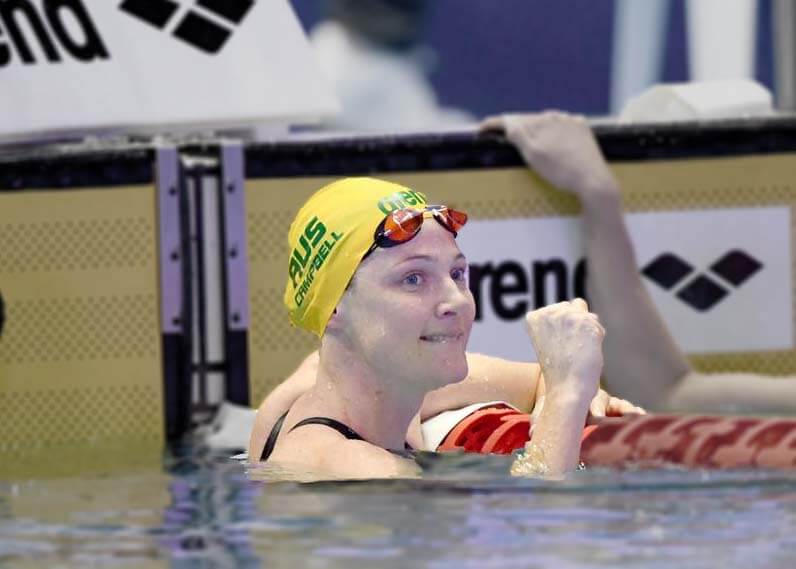
Cate Campbell and Vladimir Morozov lifted the top prizes of $150,000 each today as queen and king of a 2019 FINA Cup series speedy up top but struggling just below the surface to justify the use of the word ‘World’ in its title.
Campbell, the first Australian to lift the $150,000 prize on Cup tour, is only the second woman to deny Katinka Hosszu the overall Series victory since 2012, after Sweden’s Sarah Sjöström topped the women’s league in 2017 and 2018.
The FINA(L) CUP Scores
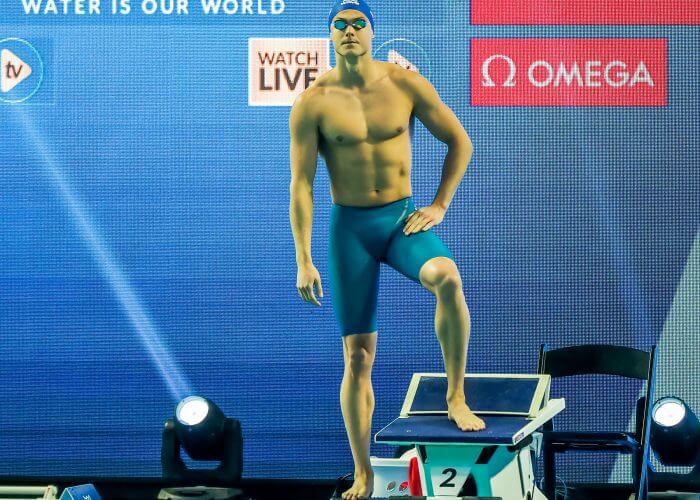
Vladimir Morozov – Photo Courtesy: Peter H. Bick
Cate Campbell, topping the points among women in the last cluster of Cup events to extend her overall lead, became the first Australian to lift the series crown since Marieke Guehrer back in 2008. Campbell’s 357 points ($150,000 straight prize without any bonuses) kept her well ahead of Katinka Hosszu, on 312 ($100,000), third place to Sweden’s Michelle Coleman, with 174 points (($50,000).
Vladimir Morozov, the US-based Russian, was the runaway victor among men, on 333 points, Danys Rapsys, of Lithuania, on 234 for second and Dutchman Arno Kamminga claimed the third prize $50,000 even though his 195 points were matched by Michael Andrew, of the USA. Kamminga won the tie break by emerging as best man in one cluster of the Cup, while the points he accumulated for his Dutch-record breaking breaststroke swims topped those accumulated by Andrew for his best efforts.
The Trouble In The Depths
Held long-course in pre-Olympic season, the Cup of seven rounds came to a close in Doha, Qatar, far from the traditional centres of fast swim nations and the sport’s fandom in a digital era that allows remote coverage but makes the dream – and indeed the stated mission of FINA in its constitution – of promoting the sport and building a wider audience ever more remote.
Australian sprint ace Campbell, with a 52.61 victory in the 100m freestyle that marked her 44th career effort of 53-flat or under – 13 of those swims belonging to this year alone – represented what it takes to be among the best in fast waters. However, most finals on the 2019 Cup were brought to a close at a pacs that the swim stars of the 1970s, 1960s and, today, even the 1950s, would have eyed with respect, no disrespect to their pioneering of half a century and more ago.
A glance back at pre-Rio 2016 Cup season confirms that an event already thirsting for quality in the depths has slid further into a mire of mediocrity below the fast surface of the few world-class swimmers who took the chance to earn the money while most of their keenest rivals around the world were absent.
Competition from the International Swimming League, a pioneering global multi-national Pro-Team event that has the backing of the bulk of the world’s best swimmers, and the introduction of a FINA Champions Series to an already blasted race calendar have contributed to the Cup’s continued decline even though FINA has upped the money in the past two seasons.
Even so, FINA has already announced the dates for the 2020 Cup, which returns to being held in short-course pools next year. It remains to be seen if the dates clash with ISL events and whether the International federation will end the contradiction of approving U.S. Pro Series events and others but refuse to approve League events and their results if those overlap on the calendar.
The irony of the situation is lost on few: Katie Ledecky, for example, is able to race on pro Tour in the USA on the same weekend as World Cup events (that she never attends) knowing that if she were to break a World record it would stand but also that had she been a finger-length faster over 400m freestyle on ISL duty for DC Trident in Indianapolis in October, the global standard she would have set would not have counted for world-record status.
The Cup Comes To A Close For 2019
Morozov did not race today, his job already done, while Campbell was out in 25.35 and home in a 52.61 she then celebrated with sister Bronte Campbell, second home in 53.37, off 25.79 at their last close turn of the Cup together. The only sprinter who has applied any sense of real pressure on the Aussie sisters on full Cup tour, Sweden’s Michelle Coleman sealed the top three on 53.39.
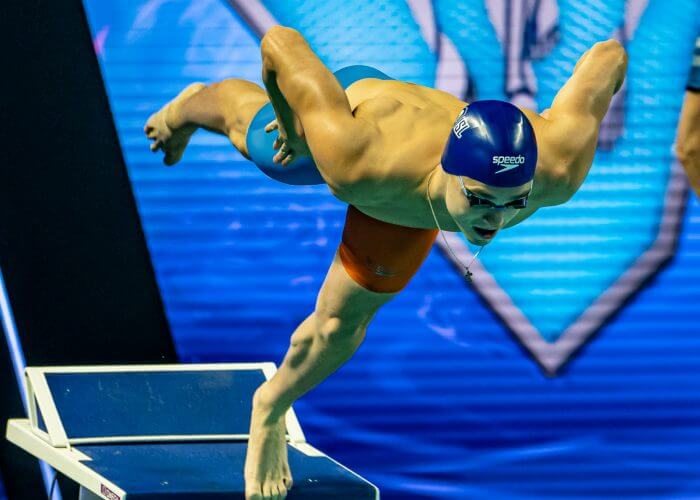
Anton Chupkov – Photo Courtesy: Peter H. Bick
The men’s 200m breaststroke produced a tight fight and another win for World champion and record holder Anton Chupkov (RUS), who turned a distance third at the 100m mark but on the way home chased down the leaders, Arno Kamminga (NED) and Yasuhiro Koseki (JPN) to snatch victory in 2:08.37. Kamminga concluded a fine season of Dutch-record setting just 0.02sec away, on 2:08.39, with Koseki completing the podium blanket finish in 2:08.66. Last home was slower than David Wilkie, 1976.
Chupkov topped the men’s points race for the final cluster of the Cup, with 90, atop 78 for Kamminga and 69 for Morozov.
Danas Rapsys, the Lithuanian who was disqualified for a false start after finishing first ahead of China’s Sun Yang in the 200m freestyle at the World Championships back in July, completed the swiftest set of 200m free swims of his career with a 1:45.50 victory ahead of Australian Alexander Graham, 1:47.23.
Sun won the World title, in controversial circumstances against a backdrop of podium protests, in 1:44.93 but will end the year outside the top 3 on the clock, topped by a 1:44.38 from Rapsys at the Singapore leg of the Cup back in August.
A 1:44.90 from Clyde Lewis, of Australia, in Gwangju semi-finals, and a 1:44.91 from one of those podium protestors, Duncan Scott, who led Britain’s 4x200m free relay, follow Rapsys on the 2019 rankings.
Katinka Hosszu Still In The Money
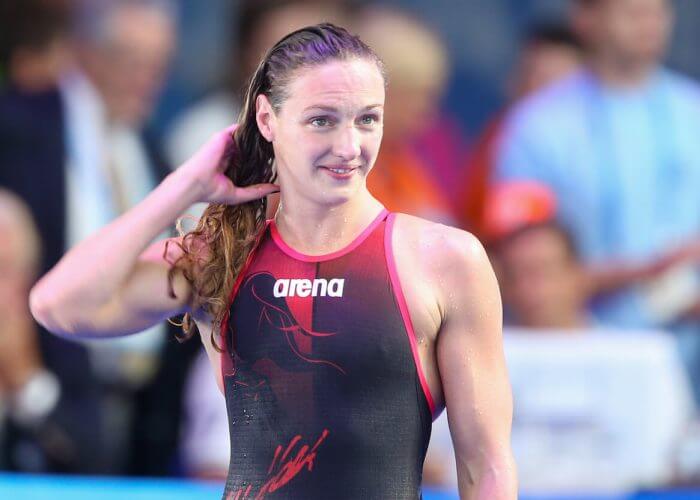
Katinka Hosszu – Photo Courtesy: SIPA USA
The women’s Cup winner in all seasons from 2013-2016, inclusive, and the biggest race-prize money earner in swimming history, Katinka Hosszu finished second overall on tour for the third time behind Campbell this year but still celebrated a $100,000 prize.
Today, the Hungarian triple Olympic champion took the 100m butterfly in 58.19 in her first race of the last day of the 2019 Cup season, keeping at bay Denmark’s comeback mum Jeanette Ottesen, on 58.52. The last three home raced at the pace of Kornelia Ender in the 1970s, though without the kind of assistance the East German teen had: our reflection on all of that on the 30th anniversary of the fall of the Berlin Wall.
Hosszu concluded her Cup campaign with a strong 2:09.89 win in the 200m medley ahead of Seoyeong Kim (KOR), 2:11.44, and Maria Ugolkova (SUI), 2:12.45.
That left the Hungarian as champion of wins on the Cup, once more. While Morozov and Rapsys celebrated clean sweeps with seven straight victories in their respective events, Hosszu made it seven out of seven in three events, the 200m butterfly and birth medleys, 200 and 400m.
A Brace For Michael Andrew
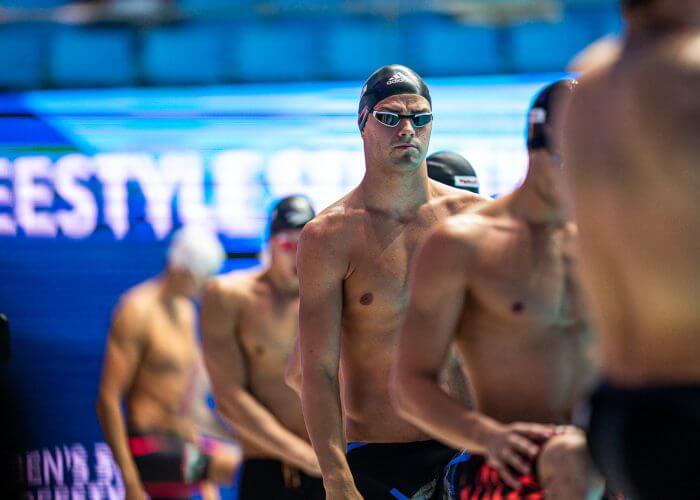
Michael Andrew in focus – Photo Courtesy: Becca Wyant
Michael Andrew (USA) sprinted inside 23 for a strong 22.94 victory in the 50m butterfly over Hungarian Szebasztian Szabo, on 23.34, both warming up for the ISL Derby qualifiers for United States-based and Europe-based Pro Teams later this month ahead of the Final Match showdown of the first league season on the cusp of Christmas.
Andrew was back in for a second victory later in the session, his 54.07 in the 100m backstroke keeping Australian Brad Woodward at bay on 54.66.
The men’s 400m medley produced a race-pace training tussle between Hungarians Balazs Hollo, 20, and the more experienced and medalled David Verraszto 11 years his senior. The younger man took the race 4:15.17 to 4:15.46, Austria’s Patrick Staber on 4:16.03.
Seventh home would have give Rod Strachan a good race back in 1976, while 8th home would have just got the better of Gary Hall (senior) in 1972 but lost out to Andras Hargitay two years later.
The women’s 200m backstroke produced an Aussie tussle but this time the race went to the more experienced national teammate over the rising star: Emily Seebohm’s 2:08.54 pipped Kaylee McKeown by 0.02sec. Last home was racing around the pace of Melissa Belote, 1972.
In other action, Brazil’s Jhennifer Conceicao was more than a second ahead of the rest in the 50m breaststroke for a 30.93 win, the last five home outside the world best time back in 1986.
Tjasa Oder (SLO) clocked 8:34.65 for the win over 800m freestyle. There were just nine swimmers in the race – and the 8th home was outside 1960 world-record pace and last home slower than Lorraine Crapp, of Australia, in 1956.




.png)